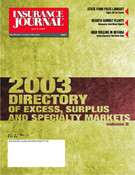California’s workers’ comp market reached yet another boiling point recently when the State Compensation Insurance Fund filed suit against Insurance Commissioner John Garamendi and the Department of Insurance (CDI) May 28, alleging the Commissioner has attempted to illegally usurp control over the Fund.
State Fund rejects Garamendi’s claim that the organization is subject to jurisdiction under Insurance Code §§ 739 et seq. (Risk-Based Capital for Insurers) due to it’s status as a “public enterprise fund.”
At press time, Garamendi had not yet responded to the lawsuit. Legally, he has 30 days to do so, which he told Insurance Journal, “we fully intend to use.”
In the meantime, Garamendi said he will continue to regulate State Fund as the law dictates.
In the official complaint for declaratory and injunctive relief, State Fund seeks judicial declaration that “the RBC Statutes do not apply to State Fund; that the Insurance Commissioner and the [CDI] do not control the operations and/or assets of the State Fund; that the Insurance Commissioner has exceeded his authority and restated the law by directing the State Fund to dismiss its legislative advocate; and the Insurance Commissioner has exceeded his authority and violated law by directing the State Fund not to write insurance for qualified employers within the State of California.”
Also, that, “the Insurance Commissioner has exceeded his authority and violated the law by directing the State Fund to take specific steps with respect to the means by which it seeks new business; that the Insurance Commissioner and the [CDI] have no authority or basis to seek title to the assets of the State Fund pursuant to Insurance Code §§ 1010 et seq.; and that he has unlawfully interfered with the management of the State Fund by its Board of Directors by, inter alia, demanding that the management of the State Fund be fired.
Following the public release of the suit, a slew of developments ensued. First was the public response from Garamendi and the CDI.
“It is very unfortunate that the State Compensation Insurance Fund has initiated a jurisdictional dispute with the California Department of Insurance,” Garamendi said in a press release. “The allegations raised by State Fund’s lawsuit are incorrect. Our actions in regard to the State Fund have been taken to ensure that it continues to have the ability to provide affordable and available workers’ compensation insurance to California employers.”
Garamendi continued, “We have made every attempt to work cooperatively with State Fund to resolve the financial problems that threaten its viability. I believe that our actions have been consistent with applicable state laws.”
Steve Young, legal counsel for IBA West, reviewed the lawsuit and said that while State Fund has challenged whether it is subject to the RBC Statutes in the Insurance Code, a more significant question may be whether the financial triggers are present that would authorize the Insurance Commissioner to take the specific actions set forth in those statutes.
Young said the suit is a “sign of the tremendous frustration that the State Fund leaders, California employers, and brokers feel with many of the actions Garamendi has taken.”
Attorney & workers’ compensation industry expert Heywood Friedman said the central question here lies within the lawsuit-Does Garamendi have the authority to do what State Fund fears-that is, effectively take over the day-to-day operations of State Fund?
According to Young, Garamendi’s various directives to State Fund have apparently not come in the form of formal written orders, although the Commissioner has publicly stated he has done so March 3, 2003, under Insurance Code 739.4(b)(3).
The plot thickened, when, on May 30, State Fund sent a fax to its brokers reiterating it’s financial status. “To set the record straight,” the letter stated, “State Fund is solvent.” The letter further goes on to explain, however that despite the fact that State Fund’s claims reserves have been deemed adequate by their appointed actuary, Milliman USA, auditing firm Pricewaterhouse Coopers LLP “has recommended that State Fund boost reserves by $800 million retroactively to 2002 and to restate our reserve figure as submitted in our 2002 financial statement to the CDI.”
The letter further stated, “State Fund believes that PricewaterhouseCoopers’ requirement to increase reserves is an over-reaction to the difficult workers’ compensation environment in California. In addition, PricewaterhouseCoopers is using a different reserve methodology that was not used in prior years, was not discussed with State Fund prior to its use, was not revealed to State Fund prior to the submission of our 2002 Financial Statement and is attempting to apply the methodology retroactively to 2002.”
In the May 19 issue of Insurance Journal West, Nils Wright reported that “State Fund maintains that it’s financial stability is not as questionable as everyone thinks. ÔAt the end of 2002, we had $8.8 billion in reserves, and our reserves were deemed reasonable,’ Jim Zelinski, spokesman for State Fund said.”
Again, Garamendi responded: “I am fully aware of the conflict between State Fund and its auditor. I and my Department have been working with State Fund management since January to determine the appropriate and safe level of reserves to ensure that injured workers can be certain that their medical and indemnity needs will be met today and into the future.
He continued, “Given the recent enormous increases in the cost of medical care and other claims-related expenses, we believe that a conservative approach to preserve the status of State Fund is appropriate. We will continue to work with State Fund, its auditors, and our own actuaries to determine the appropriate reserves level. We expect this issue to be resolved some time in June.”
An anonymous source who is an expert in the field of workers’ compensation, and has previously worked closely with both the CDI and State Fund, spoke extensively with Insurance Journal regarding the recent developments.
“The Commissioner is doing absolutely the right thing,” the source said. “It’s a shame that the other side has raised the stakes by bringing in action saying that they’re different than everybody else. The Commissioner has an absolute duty to make sure that these companies are around and that there’s a stable market. He’s simply doing what he’s taken the oath of office to do. Every insurance company is insolvent at some time in its history, and the Commissioners usually work with them to work out of it. It’s extremely unfortunate that they’re battling about it when they should be working together. The Commissioner, in my view, is totally correct.”
This isn’t the first time State Fund has struggled with financial issues. In 1975, the company faced the brink of insolvency due to the sudden exposure to a large number of cumulative trauma injuries.
According to the anonymous source, who witnessed the situation first-hand, “State Fund worked very closely with the CDI to solve all of their problems, not just cumulative injury.” Both parties worked together to reduce State Fund’s reserves, in part by transferring liability to future policyholders, the source said.
While some maintain that the State Fund’s problems are not of their own making, Friedman questions whether or not the Fund would be in the state they are currently in if they had not decided to price compete with the private carriers at the advent of open rating in 1995.
And while many will side with the Commissioner, the broker community is still reeling from the suggestions incorporated into State Fund’s business plan ordering the reduction of commissions.
“We appreciate the need for the Commissioner to pay careful attention to the State Fund,” Young said, “but many of the specific actions he has recommended will do substantially more harm than good. If the Commissioner succeeds in eliminating or substantially reducing the broker’s role, we can fairly predict that workplace injuries will increase, employers’ insurance costs will rise even higher, and State Fund’s loss experience will worsen. That might help State Fund competitors, but no one else.”
“For the State Fund to act in a preemptive manner shows how serious the disagreement is,” Friedman added. “It’s a fairly unprecedented move for any insurer to sue the Commissioner and the CDI.”
State Fund seeks a temporary restraining order and/or preliminary injunction prohibiting Garamendi and the CDI from further
interference with State Fund management. They are represented by the law firm Sheppard, Mullin Richter & Hampton LLP in Los Angeles.
To comment on this story, e-mail: cbeisiegel@insurancejournal.com.
Was this article valuable?
Here are more articles you may enjoy.


 Allstate Doubles Q4 Net Income While Auto Underwriting Income Triples
Allstate Doubles Q4 Net Income While Auto Underwriting Income Triples  India’s GIFT City Attracts Lloyd’s and Other Global Reinsurers, Sources Say
India’s GIFT City Attracts Lloyd’s and Other Global Reinsurers, Sources Say  Allstate CEO Wilson Takes on Affordability Issue During Earnings Call
Allstate CEO Wilson Takes on Affordability Issue During Earnings Call  Chubb Posts Record Q4 and Full Year P/C Underwriting Income, Combined Ratio
Chubb Posts Record Q4 and Full Year P/C Underwriting Income, Combined Ratio 


